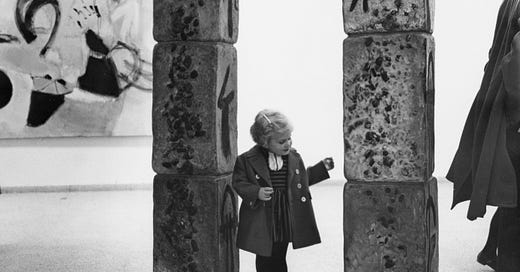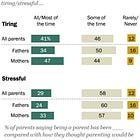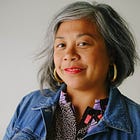Think back to your childhood. If you failed at something — how did your parents react? If you struggled with a task, a game, an obstacle — what advice or feedback did they give you? Did you ever talk about figuring out who you wanted to become, or what path you wanted to follow? Did they encourage you to try a bunch of things and figure out your passions…..or did that seem like a waste of time and money? In hindsight, what did you feel they wanted most for you? Stability? Money? Success? Happiness?
I’ve been thinking about these questions as I make my way through Adrie Kusserow’s American Individualism: Child Rearing and Social Class in Three Neighborhoods. For the book, Kusserow — an anthropologist — did extended fieldwork from 1993 to 1995 in three parenting communities: one in “Parkside” (a made-up name to describe part of the Upper East Side, where the parents were all rich and highly educated and nearly all white), one in “Queenston” (which is racially mixed and lower working-class) and one in “Kelley” (a white working-class enclave where many of the parents are upwardly mobile and own their homes).
Kusserow makes the argument that the blanket concept of “individualism” gets bandied about by scholars and writers pretty carelessly. That feeling was particularly strong when she started doing her fieldwork, when sociological studies of individualism felt both ubiquitous and imprecise (see especially: Habits of the Heart, published in 1985, and The Pursuit of Loneliness, first published in 1970 and reissued in 1990 with a new preface from Todd Gitlin). Kusserow believed that individualism functioned and manifested differently in different socio-economic groups. And she organized those differences under the rubric of “soft” vs. “hard” individualism.
How do you get people to talk about how they think about individualism? You ask them about parenting. I love how Kusserow phrases it: “I wanted to talk to individuals about something that prompted a passionate and visceral response, and child rearing always seemed to do just this. Discussions around child rearing (and the metaphors and figurative language within these discussions) also often contain hints at the kinds of trajectories parents and teachers envision for themselves and for their children.”
If you want to think about how someone sees the world, in other words, just ask them about parenting (even if they’re not parents!) So that’s what Kusserow did — visiting classrooms, sitting in on parent meetings, and then interviewing parents one-on-one. She works to sketch out what sociologist Pierre Bourdieu called the habitus of a child’s world: all that “makes sense,” “is just not done,” “is inappropriate,” usually according to the adults and authority figures in the child’s life. On the most basic level: do kids graduate from high school and go to college? On a slightly more complex one: do kids work during high school — or is that time meant for studying? When are they trusted with money? Who’s expected to pay for college? If they are expected to go to college, how many will they apply to? And what are the “acceptable” majors once they’re there?
I was particularly compelled by Kusserow’s argument that so many of the characteristics we often consider “personality traits” — things like shyness, creativity, confidence, organization, and shyness — are actually “class-learned attributes.” (And, I’d argue, larger societal position/privilege-learned attributes as well — a whole complicated intersection of your identity and the identity of the person/people doing the primary parenting). Attributes that are encouraged and applauded (and often become central forces in one’s personality) are different for Asian girls in suburban areas, for example, than Black boys in more urban ones, or white boys in rural areas.
So how does individualism intersect with all of this? As I wrote about last week, individualism is one of the United States’ “founding myths” — the way so many of us make sense of our place in the world. It influences how we think about success (and who “deserves” it) and it shadows how we think of our own achievement (and others). In short: anyone can succeed, but they should be able to do it “by themselves.” (Which of course elides all sorts of assistance, familial and domestic and otherwise, but that’s why it’s a myth!)
Kusserow saw this myth manifest differently across the neighborhoods. “Hard” Individualism “emphasized a tough, resilient self that was hardy enough either to protect itself from violence, poverty, and misfortune (as in Queenston [the lower-working class neighborhood]) or to project itself into a higher social class (as in Kelley [the upper working-class neighborhood].”
The “Soft” Individualism on display amongst upper-class parents on the Upper East Side relied on a more “psychologized” understanding of the individual. It “emphasized the delicacy of the child’s self” and “the extreme care, resources, wide canvas, and gentle touch needed to help the unique self of the child flower and open up to her full potential.”
Both of these understandings are likely familiar to you, even if you’ve never heard them described in precisely this way.
Other observations that stuck out to me, first as relates to “Hard” Individualism:
Parents from Queenstown and Kelley often emphasized the need for “soft” kids to “harden” themselves against the world in order to succeed: “if the boundaries of the self were too porous or soft, the negative influences of the street (prostitution, violence, drugs, alcohol, peer pressure, gangs) could penetrate and take over.” They often used “tough” as a compliment, along with phrases like “speaks their own mind” and “isn’t a pushover.” A “solidity of the self,” as Kusserow puts it, is a real achievement.
Where does “hardness” come from? Not being spoiled — and not being treated as an equal. It was not standard practice to consult children on major decisions (and often minor ones). There was a clear hierarchy in the house, with parents and other adults on top and kids below — and some areas of the house or kitchen off-limit to kids (and not just because of perceived danger, more like: “this is my space, not kid space.”) When talking with another adult or attending to tasks, parents would often ignore or delay requests, quarrels, or yells from the other room, believing that kids could figure most things out (and build “stamina and self-reliance”) themselves.
Humor was an essential part of grappling with adversity — and a means of diffusing potential anxiety. Humor helped kids take all of life less seriously, which was crucial, as “seriousness would result in snapping and breaking, as opposed to resiliency.”
In Queenstown in particular, where many of the parents were single-parenting or had dealt with significant financial stress, individualism took the form of “not relying on anyone else” and “not trusting anyone but yourself.” Cultivate enough self-reliance, and you could protect yourself from larger systems (the government, public housing, the justice system, white supremacy, HUSBANDS) that couldn’t be trusted
In this way, individualism could become a form of armor: “for parents, independence represented an intentional separation, distance, and isolation from past or future disappointments — it represented a barricading of the self”
There’s a fascinating section of the book where a new preschool teacher comes to the local school to try and implement a new city-wide curriculum — much of which is based on a “portfolio” where the child selects their favorite works, no matter the “quality” of the work. The teachers who’d been there for decades thought it was ridiculous — in part, as will become clear, because the entire idea is predicated on a very different understanding of the need to cultivate the creative self.
In Kelley — the white lower-middle class enclave — hard individualism was less about protection and more about class mobility. The vast majority of these parents were wealthier than their parents; many owned their own small homes. They wanted their kids to keep going. This type of individualism “had more of a pioneering sense about it,” and was less a form of protection than a means of fortifying yourself for the work of breaking into the middle or even upper class.
The Kelley parents celebrated independence and doing it yourself while also living in an incredibly close-knit community that prided itself on watching out for one another. Houses were built close together and kids played freely on the streets (and in each other’s houses); many families lived next door and down the street from other members of their extended family (and had known other residents their entire lives). Kusserow doesn’t delve too deep into this, but I think it’s a classic case of reconciling a collectivist ethos (shared care) within your very specific group, usually organized by race or nationality or ethnicity or religion, to facilitate individual member’s success (which will then trickle down to the larger group in a sort of low-key noblesse oblige)
And as for ‘Soft’ Individualism (which will sound familiar to anyone who’s been exposed to contemporary parenting advice):
For the Parkside (rich) parents, individualism wasn’t a means of defense or even a tool for class mobility. Instead, it was how children became successful, confident leaders in careers they were passionate about. Kusserow remarks that “by age three, Parkside children were already considered little competitors — small but complete ‘little people’ with their own tastes, desires, needs, and wants.”
If a child expressed a desire, it might not always have been granted, but it was always listened to. If they expressed an interest in a subject, a sport, or a hobby, they were given the tools and means to explore it. They were often consulted when making “family” decisions and their preferences were taken seriously.
The goal was less about “pioneering” or going where others had not yet gone and more about figuring out what you’re good at and then becoming the very best — even if that some amount of cutthroat behavior. As one Parkside parent told Kusserow, “I think you have to be very individually oriented to achieve.” Another, when asked what specific characteristics she’d like her child to have, said: “To be afraid to not be the best. As people, I think the idea of competitiveness is good and I want them to be successful.”
Again, instead of putting on the armor of individualism, these parents wanted their children to open themselves to possibility — to “bloom” — and then success would come their way. There’s no need to protect against broken systems because the systems (the tax code, white supremacy, etc.) are already oriented toward your success.
Soft Individualism was also associated with a certain level of stubbornness, resistance, or willfullness — none of which were understood as “bad” behavior, but “figuring out the self” or a sign of character.
Creativity was to be cultivated at all costs — not because it would provide a form of artistic fulfillment, but because leaning into one’s creative impulses again allowed them to be “the best.”
Depending on how you grew up and how you parent and how you view the world today, parts of these descriptions may sound commonsense or ridiculous or a mix of the two. Which makes sense, especially if you grew up in one class or social context and are parenting or just viewing the world from a different one.
Kusserow writes about trying to at once acknowledge and interrogate her own inclination, as the child of Vermont quasi-hippies and a graduate of Harvard, to more closely relate to the thinking around soft individualism….while also over-valorizing hard individualisms as part of fetishizing the “noble” and principled working class. It’s really hard to think about either of these modes of child-rearing without some manner of bias, much of it rooted in what you’ve come to understand over the course of decades as the “best” way to educate and nurture a child.
And yet we must think about them — and not just because this sort of research shows that our ideas about individualism swirl around kids before they reach preschool age. I keep coming back to how many attributes of “soft” individualism echo through the most lampoonable millennial cliches (special snowflake! do what you love!)…..while components of “hard” individualism have been positioned as an essential corrective to the way many of us were socialized (see: every single book and TED Talk talking about grit and hustle).
No wonder so much bourgeois contemporary parenting discourse seems to be centered on reconciling the two: fostering RESILIENT, PASSIONATE kids! And undulating beneath it all, unspoken and perhaps unconscious: the goal of preserving class status. What is “setting my kids up for success” if not “doing our absolute most to make sure they don’t fall down the class ladder?” What is “giving them life skills” if not “trying very very hard not to have them end up on the wrong side of the growing economic chasm?”
But that’s not how bourgeois people talk about raising kids. Indeed, Kusserow argues that the practices of soft individualism are particularly adept at erasing class.
“It seems to important to examine, on a philosophical level, the way the notion of a natural, real, true self, found among some the more extreme Parkside parents oriented toward pop psychology, denies the class construction of the child’s self,” she writes. “The opening up of the child’s self, which is so important in soft projective individualism, is for some parents simultaneously an exploration of the child’s supposedly true, unique, and natural self. This process of exploration is often surrounded by discourses of naturalism rather than discourses of inequality or social class.”
In other words: when people talk about all of these behaviors and ideas as “natural” or “just how I parent” they’re also avoiding larger (and often glaring) social realities. Individualism is a myth we perpetuate to justify the way we live and all the inequities innate to it. It’s always interesting, isn’t it, to see who protests most when confronted with that reality.
I’d love to read your reflections on how hard or soft individualism manifested in your childhood and shows up in your thinking today — and the language that you or adults in your lives used to talk about it and naturalize it.
And Some Related Culture Study Reads:








This is all so fascinating to me. I was born and raised very working class in the UK, and the main message I remember taking from my upbringing was "study hard; get out of here." It was hopefully my ticket to a more stable future than my parents' past - and that's proved to be true. I also learned in many other ways that I could really only rely on myself, mostly by emigrating alone, and it did take me a long time to unlearn the idea I'd internalized that my feelings/experiences were a burden to other people.
I'm fascinated by how I see these themes working out in higher ed. A lot of my colleagues are 'hard knocks' people - courses that "weed out" people; a derision toward what they think of as "coddling" - and yet very few of those educators are working class. Yet statistically a good many of the students who are "weeded out" are - and i wonder if there's some sense among the professorate that hard truths are for precarious, lower-class students, or students who are marginalized on any other number of fronts, students who come into college with fewer resources whether those are financial or educational or something else. Or perhaps if you come from a background with more resources, and perhaps a different relationship to the self from your parents' choices, hard-knocks approaches land differently?
My dad was a Queenstown adult who succeeded at class ascension but did not know how to raise us other than with the same information he had been given which was “you can do whatever you want, but you’d be able to take care of yourself”. I would really emphasize that for people who grew up extremely poor, and especially poor and brown in America - preparing kids with that ethos is a form of love and responsibility, not neglect and uncaring (as it could be seen from the outside).
Observing (city) upper middle class parents of this era, there is definitely a visage of “explore your individual interests”, but only *certain* interests and only so much as they will add to your prep or college resume, and parents will manipulate and bully on their child’s behalf to be sure that they are as high up in the crab barrel as possible. Which is interesting, because it’s a very modern subthread of the fake individualism that has prevailed in American culture. Like, parents are *aware* they are socially expected to encourage their kids interests in order to effectively class signal, so they pantomime encouragement, but they are manipulating those hobbies to an extent that they might as well go the more rugged straightforward route.
Not saying I’m doing it any better, just an observation!